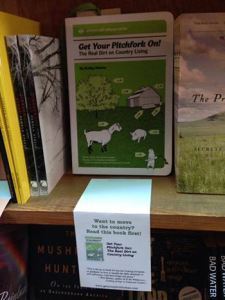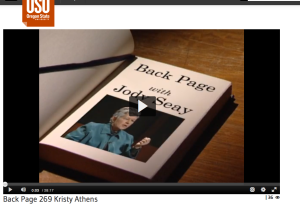Kristy Athens's Blog, page 4
June 29, 2014
Athens Sisters Tame the Wild West
I had to go to Portland on Thursday because I’ve been accepted into Oregon Humanities’ Conversation Project roster. More on that in a future post! After I put this in my calendar a couple of months ago, my sister called to see if she could visit the same weekend, as it’s right before her birthday. At first I thought it wouldn’t work, but then …
“Why don’t you meet me in Portland, and we’ll drive out together?”
So, she did! She hasn’t been in Eastern Oregon much, so we made a lot of stops. The first was supposed to be The Dalles, but on the way I realized we were passing Mosier. Mosier + Summer = Cherries. Change of plans!
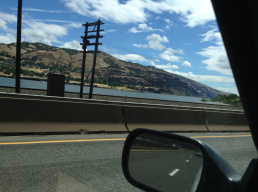
Good day for driving
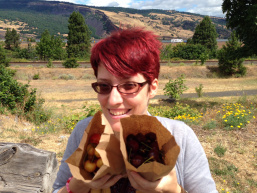
Cherries!
I love that Mosier has this roadside stand, from which they peddle mountains of cherries in little paper sacks. I bought a pound of Bings and a pound of Rainiers. I took a few steps and realized that was not nearly enough, turned around, and bought an additional four pounds!
When we finally hit The Dalles, we were ready for lunch at the Baldwin Saloon. Whenever I go to Portland I gorge myself on Japanese and Indian food, and any kind of seafood. Wallowa County is great for local meat (especially grass-fed beef), handmade chocolates, and rye whiskey, but has some gaps in its repertoire. So the obvious choice was the bouillabaisse.
We stopped in to say hi at Klindt’s Booksellers, where I signed copies of Get Your Pitchfork On! at last year’s book fair, and found my book in their front window display! Pretty great.
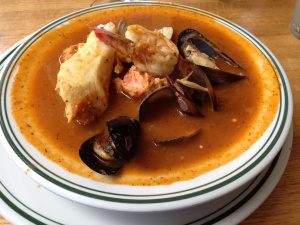
Yum
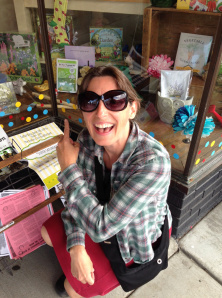
Klindt’s Booksellers!
Two hours later: Pendleton. I passed the drive-time singing along to old cassette tapes, and was glad to take a break to show Linda the requisite sights of the site of Ye Olde Round-up.
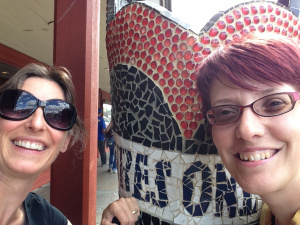
Giant cowboy boot in front of Hamley’s, of course
By the time we got to La Grande, almost everything was closed! We walked up and down Adams and pressed on–we were starting to want to get to our destination. The drive into the Wallowa Valley was marvelous. It’s fun to share such a beautiful place with someone you love. Happy birthday, Linda!
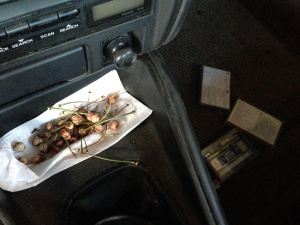
Remnants of the road trip


June 22, 2014
Dust
I had a little time off from school, so I made a beeline for my other desk—the one where I make collage artwork. I hadn’t visited it since January, when I made some valentines for my Etsy site. Our household was in dire need of new thank-you cards, and I was more than happy to do something that did not involve a computer.
I noticed that everything on my desk had a fine layer of dust on it. I opened a drawer and found that everything in it had a fine layer of dust as well. I laughed—even down in the basement, where we hardly go, there is dust!
Living in the country means living with dust. I knew that from being in the Columbia River Gorge. In Get Your Pitchfork On!, I talk about the cloud of dust that careened toward our house every time our neighbors went up or down their driveway. It’s compounded on this, the “dry” side of the state.
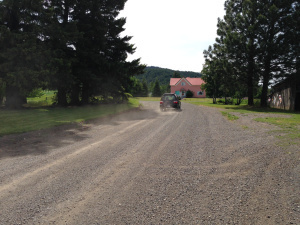
This was the best demonstration I could provide … we just had a few rainy days!
During our first warm spell, the people from whom we’re renting this house sent us a note explaining where to install the air-conditioner unit, which is in storage next to the furnace. “It helps keep the dust down,” they said.
Mike and I are not fans (pun intended) of air conditioners. We will open all the windows, except those facing the road, and just keep wiping it off. I do worry about our electronic devices, but what is the point of summer weather if you can’t have fresh air?


June 15, 2014
New Shelf Talkers
I was buying some books for grad school at The Book Loft, when I suddenly had an idea. Tourists who come to Wallowa County over the summer and get romantic notions about moving to the country are great candidates for my book. How could I get them to notice it?
“Would you be willing to put up a shelf-talker for Get Your Pitchfork On?” I asked Mary, the owner.
“Sure!” she said. “I’ve already moved it up here.” She pointed to a special display for books written by local writers. I’m officially a local!
I went home and re-configured a flier I use for farmers markets, et voilá!
In case your micro-vision isn’t what it used to be, the headline reads: “Want to move to the country? Read this book first!”
Just wish I’d thought of it sooner! If you want one to bring to your local store, please contact me with your mailing address at kristy @ kristyathens.com. I’ll send one and include a small gift for you!
And keep shopping at those independent bookstores! None of this would have happened on Amazon.com.


June 8, 2014
Cottage Industry Laws
One sunny morning last autumn I went to the farmers’ market for pumpkins, eggs, and whatever vegetables were still available at this, the final market of the season. One of the more prominent booths, Magic Garden, featured friendly elderly ladies offering produce, dried herbs, and a dozen different types of relishes and sauces in home-canning jars.
“We can do this now,” one of them said brightly while passing her arm above the display, “thanks to that new law.”
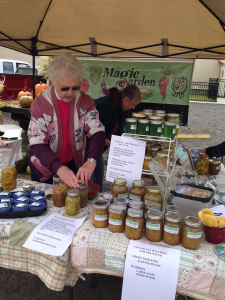
Magic Garden market booth
The law to which the vendor referred was Oregon HB 2336, signed in 2011 and implemented in January 2012, which allows farmers to process their own produce in a limited number of ways, and then sell directly to consumers in a farmers’ market setting. Previously, the canning would have been required to occur in a licensed commercial kitchen.
I talk about value-added products in Get Your Pitchfork On! and in a blog post—it’s a great way to improve one’s profit margin and reduce food waste from spoilage.
The Magic Garden is an effort of the local Methodist church to provide a farm-to-school experience for the students of Joseph Charter School. They function solely with volunteer work and donations; all of the proceeds from the market booth go directly to the cost of seeds, infrastructure and other materials. None of the wares at the market were technically for sale; any money given by customers was donated.
Until HB 2336 became law, the Magic Garden’s offerings were limited to excess unprocessed vegetables that hadn’t been fed to the schoolchildren. Once it was legal to process the produce, volunteer gardeners gleaned their plot more heavily, wasting less edible material and increasing the amount of money they could raise for the organization.
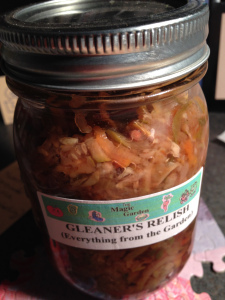
Gleaner’s Relish
Similarly, HB 2872 loosened the restrictions on small and medium-sized farms that raise poultry for slaughter. Farmers may now sell up to one thousand poultry (chickens, geese, ducks, turkeys, or guinea fowl) directly to consumers, exempt from Oregon Department of Agriculture fees and continuous USDA inspection.
These two recently passed laws make it easier for small and mid-sized farmers to sell their produce and, thereby, make a living (though their income from such is capped at $20,000). Most states also have a version of this law on the books. This type of legislation begins to address the inequities in agriculture policy that are rife in the United States. Current USDA policy, most notably under the “Farm Bill,” directs most of its support and subsidies to international corporations. The policies of the past forty years have left smaller operations struggling to make ends meet, resulting in a lost heritage—younger generations are encouraged to leave farming as their career and consumers lose their contact with the sources of their food—as well as a lost quality of food. The prospect of state-level exemptions and other legislative strategies that temper the inequities codified by federal law are an important step toward reforming the Farm Bill itself.


June 1, 2014
Mother Earth News Fair
Where can you find a blacksmith, a bunch of baby pigs, mushroom kits, ten different breeds of herding dog, a lamb-butchering demonstration, a portable sawmill, and me? Puyallup!
The Mother Earth News has been around since the previous wave of back-to-the-landers hit the ground, in the early 1970s. Since then they’ve been giving people advice about self-reliance and rural living, and keeping old traditions alive. They are best known for their magazine, but they also host four fairs every year, in Kansas, North Carolina, Pennsylvania, and Puyallup, Washington. For the last two years, I’ve gotten to take part in the Washington fair by presenting the companion workshop to my book, which I call “Get Your Country On!” (Sense a theme?)
The fair is a great outing—big enough that there is variety and small enough that you can take everything in. You have to plan your workshop time carefully, however, as there are a number of competing stages. I found myself catching half of a lot of them so I could cover more ground. I learned about selling rabbit (not regulated by the USDA as meat!), heritage pig breeds, the health benefits of raw milk, and how Americans are unduly obsessed with marbling in beef,
Friends from Seattle met me there, one of whom is three years old. This boy had a great time checking out the llamas, poultry, sheep, goats, and other animals. He was especially fond of the Deere.
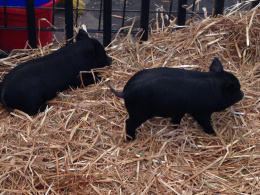
Piglets!
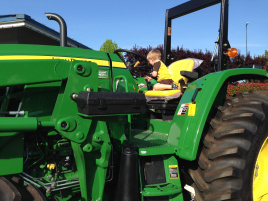
Tiny boy, big tractor
After taking a hiatus from public appearances due to my current remote location and graduate studies, it felt good to talk with people about moving to the country again. I love hearing their dreams and plans, and giving them ideas to hopefully make them even better prepared. And I was very happy to update my slideshow to include the fact that I now live in Wallowa County!
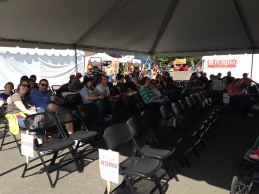
Pre-show audience
For those of you who were at the presentation yesterday, here is the link to my Big R blog post, so you can enjoy the photos that you missed when my slideshow crapped out!


May 25, 2014
Morels: A Photo Montage
Sometimes, people are nicer to you than you deserve. Just the other day, our friend Janis shared some of her morel mushroom bounty. For newcomers who don’t know where any good picking spots are, this was quite a gift.
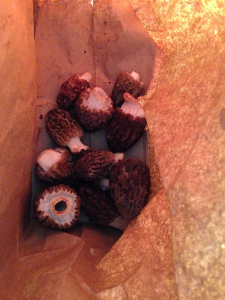
In the bag
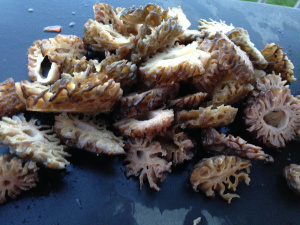
Sliced
Mike cooked them up real nice. Thanks, Janis!

Sauteéd

Delicious!


May 18, 2014
The Dangerous World of Soroptimist Silent Auctions
It seems like most small towns have a thrift shop. It’s a great way for a community to repurpose items that are no longer needed by one person and get them to another.
My love of and lament over today’s thrift stores is well documented in this blog post. However, I have developed a great appreciation for the Soroptimist thrift store in Enterprise. The Soroptimists have retained the notion that the purpose of a thrift shop is to make available clothing, dishes, and other household items for people who don’t have expendable income. Most things in their store are sold for 25 cents. Cents, people! Those are 1970s prices. They’ve been able to maintain this without being pillaged by the EBay crowd, I believe, because Enterprise is so far from Portland or any other metropolis, and because they are only open Monday and Tuesday. And since the wares are donated from the community, there are very few pristine Pendletons coming down the pike.
It’s hit-or-miss, but I’ve found a couple of great items since I moved here. And they’ve cost 25 cents. I don’t even try clothing in the fitting room there—I take it home and, if it’s not right, simply re-donate it! It’s also been great for puppy toys, blankets and towels.
The money the Soroptimists collect is repurposed, just like the goods they sell, in the form of scholarships for local women to attend college.
Occasionally something is donated to the Soroptimist thrift store that is just too nice for even them to sell for 25 cents. Then, it might have a special tag and cost 50 cents, or maybe even a dollar.

This Arnel’s vase from 1975 … 50 cents
And then, to really make some money, they have the silent auction.
Behind the counter are about a dozen lots. Sometimes there is a saddle. Sometimes a set of Pyrex bowls. A fancy vintage hat. Every two weeks they change the line-up, tape the bidding sheets to a post, and open the auction.
One week there was an embroidered Mexican wool blanket. It was incredible: Beautiful. Pristine. I don’t need a blanket, but this was too good to pass up. I walked over to the bidding sheets. A woman had written down $15. That was a pretty high bid for these parts, but a steal for this blanket. I bid $20.

I forgot to take a picture of it, but it was crazy-gorgeous like this picture I found on the internet!
The following Monday, I popped in to check the sheet. A woman I knew, Pat, had increased the bid to $27! I was torn.
As I cover in great detail in Get Your Pitchfork On!, negotiating small-town politics is tricky, and I’ve found it really, really important not to mess it up. How would it be interpreted if I raised my bid? I told myself it was more important to make peace than get this blanket.
Then I went over and examined the masterful embroidery again. Dang it. I raised my bid to $30.
The auction closes at 2 p.m. and then they call the winners. That afternoon, I didn’t get a call. Oh well, I thought, Pat must have come in before 2 and raised her bid. I’d rather she get the blanket than I create a rift so early in my tenure in Wallowa County.
On Friday, I saw Pat at a literary reading.
“You got the blanket, congratulations,” I said.
Pat looked confused. “No, you did!”
I shook my head. We stared at each other for a minute, then said in unison, “Who got our blanket?!”
I went into the store on Monday and inquired. They told me someone else had come in right before 2 o’clock and bid $35.
Lesson learned: If there is something in the silent auction that I really want, I’m going to have to stand vigil in front of the bidding sheet at 1:50.


May 11, 2014
Recycling Day
I talk about dealing with trash and recycling in Get Your Pitchfork On!—at our place in Washington, there was (in my mind, at least) an epic battle between Kristy the Female versus the reigning King of Sh*t Mountain. We took our waste to a “transfer station,” so-named because it was en route to other locations, including a landfill located in nearby Roosevelt. This landfill also took in garbage from Hawai`i, which subsidized our fee.
In Wallowa County, recycling happens in town and trash goes straight to the landfill, which is about six miles out of Enterprise. As the oft-mentioned-in-this-blog Jon Rombach noted in November, you never know what you might find there.
In the local newspaper, the Wallowa County Chieftain, Rick Bombaci investigated what actually happens to the recycling. At the transfer station, it’s sorted a hundred ways ‘til Sunday via a bunch of small doors—where does it end up?
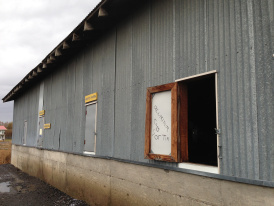
A place for everything …
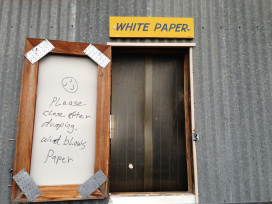
… and everything in its place
His research was eye-opening! Some things are reused locally: Glass ends up crushed and mixed with gravel for the county’s roadbeds; motor oil is burned in the furnace of the road department’s office. Paper, on the other hand, is shipped to China. Not cardboard, just paper. I was glad to see that electronic waste is not shipped to China, as their processing of it is well documented and not pretty. It’s processed in Vancouver, Washington.
Do you know where your trash and recycling go?


May 4, 2014
Happy 2nd Anniversary, GYPO!
Get Your Pitchfork On! is two! I’m at an intensive weekend workshop for my graduate school program, but I wanted to pop out for a sec and acknowledge Process Media for publishing and promoting this book. To celebrate, here is a link to an interview I had with Jody Seay. They had to edit out part because I started fumbling with my lav microphone, thinking my shirt had unbuttoned! Ah, show biz.


April 27, 2014
Small Town Good Time
Commonly asked of people who move to the country by people who live in the city: What do you do there for fun?
It’s a reasonable question from someone with an untrained eye. There is no movie theater, no professional theater company. Most shops close at 6. Joseph used to have a bowling alley, but it was recently converted into a hardware store. A hardware store with really nice maple floors.
The answer is: You make your own fun. That might mean board games. That might mean softball. A hike. Fishing. A front-porch hootenanny. Taffy-pulls are not out the question. When I lived in the Columbia River Gorge, I heard tell of a swingers’ club. Don’t think there’s anything like that out here!
One thing we don’t do is stand in line to get into a bar. Nor do we pay $10 for a cocktail. Nor do we wait ten minutes to get said cocktail. However, if you’re looking for something more complicated than a rum-and-Coke, you’re probably out of luck. I stick with whiskey on the rocks. Foolproof.
Anyone who has young children spends Friday night the same way, no matter where they are: At their home, or the home of a friend with similarly aged children, or a school- or church-related activity. There are other kid-friendly events, mostly fundraisers and festivals, but those are usually during the day. On the other hand, many nighttime activities that might not welcome children in the city (events at the art center, square dances) do in the country.
Most of the traditional Friday-night revelry (i.e., beer-drinking) takes place in Enterprise or Joseph, at the Range Rider or the Hydrant, respectively.
Last night, I met a bunch of friends at the Hydrant for karaoke. I think I can count the number of times I’ve done karaoke on two hands, and I can’t remember the last time I sang, so it seemed overdue.
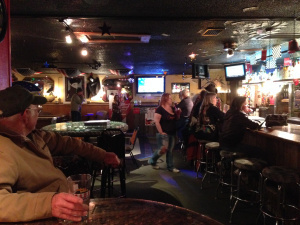
Karaoke night at the Hydrant: No cover and no lines
Even for Wallowa County in April, this was a thin crowd. One reason was there was some sort of dance party at the Stubborn Mule, a couple blocks away, from which a few people defected around 11 because it was too boom-boom-boom with the techno music.
I had a great time, singing “9 to 5” with one friend and “Suspicious Minds” with another. The bartender poured my whiskey just right. I’ve been too busy with school to worry about how to spend my Friday nights, but karaoke is an option I may revisit. I’m still hoping for bowling—the Fraternal Order of Eagles in Enterprise bought the equipment.



